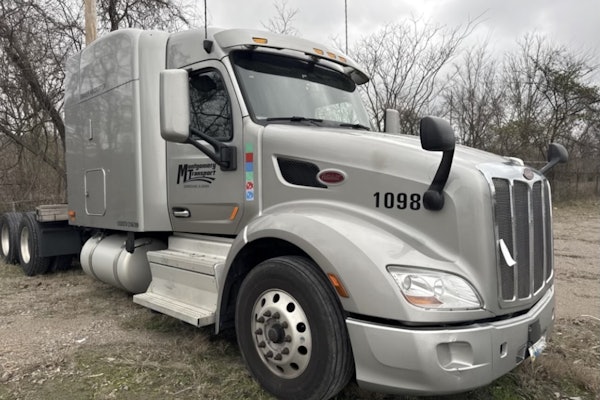Pegasus TransTech introduced a new feature to its Transflo Express truck stop scanning service. Drivers and owner-operators will be able to transmit documents electronically to their fleets using any fax machine or a scanning-enabled personal computer with an Internet connection. Fleets receive delivery documents in a standard format, regardless of a document’s method of transmission.
Teletouch Communications, a provider of wireless asset monitoring will now offer dual-mode communications. A CDMA-based modem is scheduled to be available by the end of June, and the GSM-based modem will hit the market later this year. The modems will switch automatically to low earth orbit satellites when cellular networks are unavailable.
Satellite Security Systems launched Ionit, a satellite security and monitoring solution for tethered and untethered trailers. Ionit is solar powered with a reserve battery and works with FleetGuard, a desktop application that allows managers to view, monitor and track each vehicle.
McLeod Software released a revenue/expense allocation module for its LoadMaster management software system. The new business intelligence software tool allows carriers to code tractors, drivers, and orders/ movements so that they can track, report on, evaluate, and determine profitability for certain elements of their business, the company says.
Maddocks Systems Inc. said Bismarck, N.D.-based CrossCountry Courier (CCC) selected Maddocks TruckMate for Windows (TM4Win) software solution for its expedited LTL operation covering North Dakota, South Dakota and Minnesota. Among the TruckMate features CCC will use are visual crossdocking, LTL dispatch planning and management reports.
Carrier Logistics said Billings Freight Systems Inc., an LTL carrier based in Lexington, N.C., selected its FACTS2000 freight management system to support its expedited freight service by reducing administrative costs for rating, billing, and dispatch and providing customers with the ability to trace shipments online.
At truck stops and travel centers nationwide, the increasing availability of wireless local area networks, or Wi-Fi, is a welcome benefit for truck drivers. By some estimates, 20,000 drivers use 802.11b or 802.11g wireless network cards in laptops for broadband Internet access.
Despite the growing popularity of Wi-Fi among drivers, its potential for application to fleets is unclear. For applications requiring only periodic communications, such as downloading engine or vehicle data during fuel stops, Wi-Fi has potential. Before investing much time or money in Wi-Fi, however, fleet operators understandably want assurances that applications will work at all locations where Wi-Fi is available, regardless of the Wi-Fi vendor. As of today, that guarantee simply doesn’t exist.
There’s hope, however. The truck stop and travel plaza industry and providers of Wi-Fi services, through the American Trucking Associations’ Technology and Maintenance Council, are finalizing a standard set of Wi-Fi practices and approaches. The standards will help to ensure that applications will work at any fixed point of Wi-Fi presence, regardless of the provider, says Gene Bergoffen, secretary of the TMC task force and a technology consultant to NATSO, which represents truck stops and travel plazas.
One of TMC’s recommendations is the use of automatic logon procedures. By using Media Access Control (MAC) address identification – a unique hardware number that is sent automatically from a client device through the 802.11g network – a Wi-Fi provider can automatically identify and authenticate the user.
With automatic logon procedures, fleets will be responsible for controlling security and nature of data exchange, such as deciding which communications to authorize when a client device detects a hotspot. These requirements can be pre-programmed into a client device such as a vehicle’s electronic control module, Bergoffen says.
To simplify billing and to simplify roaming agreements, the TMC also recommends that Wi-Fi providers capture the following data elements: the MAC address, start and end date/time, and the access point identifiers.
“It is going to be in the absolute interest of all parties to be able to interact and seamlessly roam truck stop to truck stop, or to weigh station environments,” says David Mendez, a task force member and executive vice president of Siricomm Inc., a provider of wireless networks at truck stops and transportation-related venues.
Flying J is not a member of NATSO and is not participating in the TMC task force, but the company’s Wi-Fi offering is moving in the same direction, says J.J. Singh, vice president of Flying J’s communication services. Flying J has installed its own hotspots at all of its 155 locations nationwide as well as at 100 of its competitors’ locations. The company will allow MAC addresses for logins this year and will offer roaming agreements as it makes sense for customers and from a strategic position, Singh says. “We don’t intend to be an island by ourselves.”
TravelCenters of America also offers its own Wi-Fi service while the other major truck stops use third-party services. The largest of these third-party services, Truckstop.net, currently provides Wi-Fi at 500 locations and plans to be at 1,000 locations by the end of the year, says Allen Meiusi, chief operating officer.
Demand for Wi-Fi hotspots is growing rapidly, and pioneers like Flying J, Siricomm and Truckstop.net can’t wait for a consensus on standards before moving forward. But in the long run, it’s not really logon standards and availability of roaming agreements that will determine the value of Wi-Fi to fleet operators. Nor will price and coverage will decide this course. These factors address the desirability of the communications backbones, which are meaningless without applications to run on them. A more important concern is the integration of Wi-Fi into routine processes, such as engine diagnostics or billing.
There’s another unknown: whether next-generation cellular networks will replace hotspots. “Truck stops are very excited about building [Wi-Fi], but I don’t believe the revenue will stay,” says Chris Everhart, chief operating officer of IdleAire, which is installing hotspots at 400 truck stops as part of its anti-idling/driver comfort system. “I believe that cellular companies will put Wi-Fi on their cell towers and that Wi-Fi will become a commodity,” he says. “It’s headed in that direction.” (See “A need for speed?”, CCJ, January 2004.)
So-called 3G networks may eventually render Wi-Fi hotspots obsolete, but standards, protocols and applications developed today for Wi-Fi hotspots should work just as well on wireless Internet connections provided through 3G cellular networks. Again, it’s all about the applications.
Dossier, FleetOutlook automate maintenance input
Arsenault Associates and MobileAria, a subsidiary of Delphi specializing in wireless systems and fleet management services, announced the availability of Dossier Onboard, an automated version of Arsenault Associates’ Dossier fleet maintenance management software.
Dossier Onboard automates the reporting and recording of maintenance issues sensed by FleetOutlook, Delphi’s in-dash Truck Productivity Computer (Truck PC), as well as a vehicle’s mileage and fuel consumption. When a vehicle has a major problem, the driver is audibly alerted of the issue through FleetOutlook via the truck’s radio speakers. The issue is also automatically reported to Dossier Onboard software along with the vehicle’s identification, the VRMS or other code identifying the component in need of attention, a brief description of the problem, and the current meter reading. This message can also be automatically sent directly to a fleet manager’s pager or cell phone, says Charles Arsenault, president of Arsenault Associates.
Minor issues with a low level of priority are simply passed along as a work pending issue to Dossier’s automated Daily Reminder feature for future handling. With a single mouse click, the work pending feature instantly converts the message into an open repair order with all of the initial pertinent unit information pre-entered. The second phase of Dossier Onboard, due to be released later this year, will include automated pre- and post-trip DOT vehicle inspection recording and reporting.
Smartmile automates data downloads
SCI Distribution LLC announced the launch of Smartmile, a low-cost way to automate reporting of vehicle and engine data as vehicles enter and exit company premises. Smartmile, a battery-powered unit the size of a cell-phone, is programmed with a vehicle’s ID number, the date, and the time. The device is installed in the cab and connected to the pulsar cable of the engine’s onboard computer. Through radio frequency (RF), Smartmile automatically sends this data as well as vehicle mileage, engine hours, and, if desired, information from the J1708 vehicle and engine databus, says Tal Ezra, president and CEO of SCI Distribution.
Smartmile costs $150 and requires no additional costs for wireless service since the data is sent via RF. Through an RS232 plug-in device, fleets can also input data from any other in-cab device or computer to transmit data to the office through RF, Ezra says. The data from Smartmile can automatically enter into third-party fleet maintenance software systems. In addition, Smartmile can be used in conjunction with SCI’s onsite fuel management system which utilizes radio frequency and smart card technology for complete control over fuel dispensing and managing and monitoring all fuel transactions.








